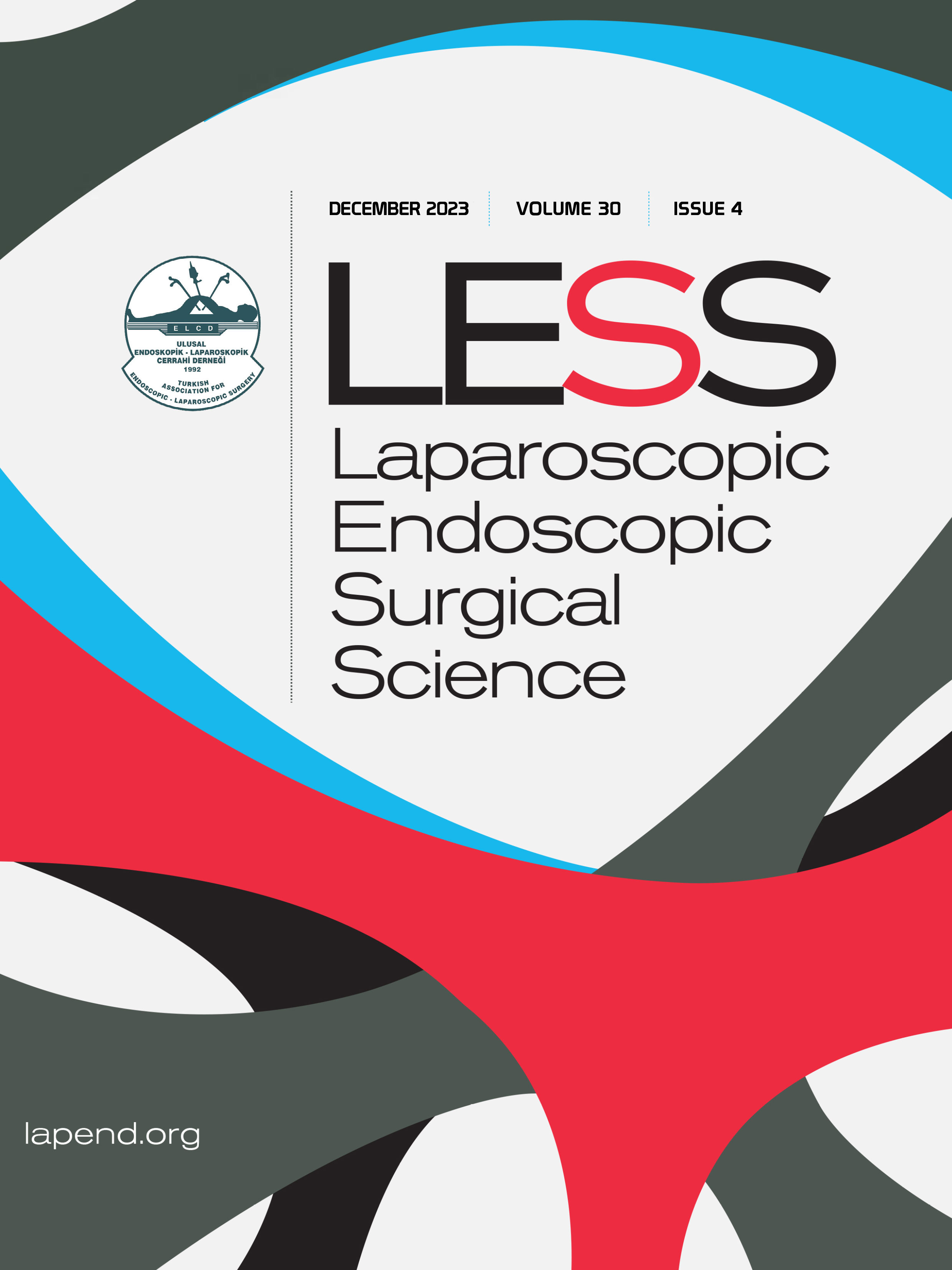Robotic versus laparoscopic sleeve gastrectomy in the treatment of morbid obesity
Afag Aghayeva, Ismail Ahmet BilginDepartment of General Surgery, Acıbadem Mehmet Ali Aydınlar University Faculty of Medicine, İstanbul, TurkeyINTRODUCTION: Laparoscopic sleeve gastrectomy (LSG) has become the preferred procedure in the surgical management of morbid obesity. However, there are as yet few studies that include results of robotic sleeve gastrectomy (RSG). The purpose of this retrospective study was to compare the outcomes of RSG with those of the LSG technique.
METHODS: The records of all patients who underwent LSG or RSG between December 2015 and April 2018 were retrieved retrospectively from the prospectively maintained registry of a single institution. The demographic details of the patients and the perioperative parameters and postoperative short-term outcomes were compared.
RESULTS: A total of 41 patients were included (20 RSG patients vs. 21 LSG patients). There was no statistically significant difference in the demographic details, with the exception of age. The patients in the RSG group were younger than those in the LSG group (p=0.038). The mean operating time was significantly lower in the LSG group (120±34.57 minutes vs. 154±41.41 minutes; p=0.001). The mean estimated intraoperative blood loss was significantly lower in the RSG group (13±14.18 mL vs. 28±16.30 mL, p=0.003). There were no significant differences in the number of postoperative complications, reoperation rate, or the length of hospital stay between groups.
DISCUSSION AND CONCLUSION: According to the results of this study, the robotic approach had comparable results to the laparoscopic approach in sleeve gastrectomy. Further prospective comparative studies are needed.
Morbid Obezitenin Tedavisinde Robotik ve Laparoskopik Sleeve Gastrektomi Tekniklerinin Karşılaştırılması
Afag Aghayeva, Ismail Ahmet BilginAcıbadem Mehmet Ali Aydınlar Üniversitesi Tıp Fakültesi, Genel Cerrahi Departmanı, İstanbul, TürkiyeGİRİŞ ve AMAÇ: Laparoskopik sleeve gastrektomi (LSG), morbid obezite tedavisinde tercih edilen bir yöntem olmuştur. Robotik sleeve gastrektomi (RSG) ile ilgili yeterince çalışma yoktur. Bu retrospektif çalışmanın amacı, RSG tekniğimizi sunmak ve sonuçlarını LSG tekniğiyle karşılaştırmaktı.
YÖNTEM ve GEREÇLER: Aralık 2015 ile Nisan 2018 arasında laparoskopik veya robotik sleeve gastrektomi yapılan tüm hastalar geriye dönük olarak çalışmaya alındı. Demografik özellikler, perioperatif parametreler ve postoperatif kısa dönem sonuçlar karşılaştırıldı.
BULGULAR: Toplam 41 hasta dahil edildi (20 RSG hastası, 21 LSG hastası). Demografik verilerde yaş dışında istatistiksel olarak anlamlı bir fark yoktu. RSG grubundaki hastalar, LSG grubundan daha gençti (p=0,038). Ortalama ameliyat süresi LSG grubunda anlamlı olarak düşüktü (120 ± 34,57 dk vs. 154 ± 41,41 dk, p=0,001). Ortalama tahmini intraoperatif kan kaybı RSG grubunda anlamlı derecede düşüktü (13 ± 14,18 mL vs. 28 ± 16,30 mL, p=0,003). Postoperatif komplikasyonlar, reoperasyon oranı ve hastanede kalış süresi açısından gruplar arasında fark yoktu.
TARTIŞMA ve SONUÇ: Bu çalışmanın sonuçlarına göre RSGnin laparoskopik yaklaşım ile karşılaştırılabilir sonuçları olduğu görüldü. Gelecekte prospektif karşılaştırmalı çalışmalara ihtiyaç vardır.
Corresponding Author: Afag Aghayeva, Türkiye
Manuscript Language: English












